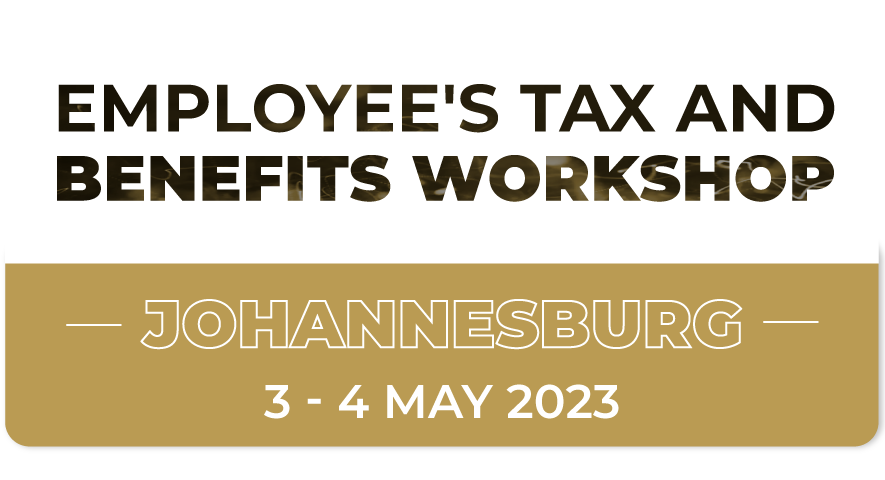
Please join us in-person for our market-leading 2-day workshop that incorporates the fundamentals surrounding employees’ tax.
Co-presenter: Jerry Botha
Co-presenter: Tanya Tosen
Fee: R4,750 (excl. VAT) for 2 days

The training is tailored specifically to the needs of attendees. It will typically cover the basics of employees’ tax, personal tax computations and benefits. Our training starts with the assumption of a zero-knowledge base and takes delegates step-by-step through the basic calculations which build up to more complex computations. We will be performing approximately 48 practical calculations during the two days.
Delegates walk away with the ability to do actual tax calculations and verifications as opposed to just the technical theory.
This training opportunity forms part of Tax Consulting South Africa’s industry contribution, and you are encouraged to register your wider HR or finance teams. This is a safe learning environment, where the emphasis is on true knowledge transfer and learning.
KEY AREAS OF THE PRESENTATION
The past attendees have ranged from new entrants to the HR profession, with little or no basic knowledge of tax and payroll practices, to advanced HR, payroll and reward professionals. We have even had MD’s attend our training.
Attendance Certificates will be issued to everyone for the purpose of obtaining CPD points at their respective professional bodies.

Jerry Botha
Jerry has over 25 years of experience and is a well-respected and leading tax professional in South Africa. He enjoys presenting and is passionate about tax and international individuals. Jerry founded Tax Consulting South Africa in 2005, which has become South Africa’s largest independent tax practice.
Jerry is the principal author of two editions of the LexisNexis “Expatriate Tax” textbook, as critically acclaimed by the esteemed Judge Dennis Davis. He was also the tax technical advisor to the Expatriate Petition Group, which argued against the complete repeal of the expatriate tax exemption in Parliament, resulting in a partial win; with the R1m (now R1,25m) threshold introduction in 2017.

Tanya Tosen
Tanya Tosen’s experience spans over the mobility, HRIS, payroll, tax, and benefits spheres.
She holds a B-com Financial Accounting degree, a Computer Science diploma as well as an Advanced Certification in Tax from the University of Pretoria.

Jerry has over 25 years of experience and is a well-respected and leading tax professional in South Africa. He enjoys presenting and is passionate about tax and international individuals. Jerry founded Tax Consulting South Africa in 2005, which has become South Africa’s largest independent tax practice.
Jerry is the principal author of two editions of the LexisNexis “Expatriate Tax” textbook, as critically acclaimed by the esteemed Judge Dennis Davis. He was also the tax technical advisor to the Expatriate Petition Group, which argued against the complete repeal of the expatriate tax exemption in Parliament, resulting in a partial win; with the R1m (now R1,25m) threshold introduction in 2017.

Tanya Tosen’s experience spans over the mobility, HRIS, payroll, tax, and benefits spheres.
She holds a B-com Financial Accounting degree, a Computer Science diploma as well as an Advanced Certification in Tax from the University of Pretoria.
Controlled Foreign Companies –
South African Tax Considerations
Controlled Foreign Companies – South African Tax Considerations
South Africa’s tax system includes a Controlled Foreign Company (CFC) regime designed to address the taxation of income earned by foreign companies owned by South African tax residents.
Where a South African tax resident holds or controls a foreign company, they may be subject to income tax in South Africa on the CFC’s foreign income, even if that income has not yet been distributed. This is an anti-avoidance measure to prevent South African tax residents from utilising foreign companies in the avoidance of South African tax.
What is a Controlled Foreign Company?
A CFC is broadly defined in section 9D of the Income Tax Act, No. 58 of 1962, as any foreign company where more than 50% of the total participation rights or voting rights are directly or indirectly held or exercisable by one or more South African tax residents.
Where this threshold is met, and unless a specific exemption applies, the net income of the CFC must be included in the income of the South African resident(s) in proportion to their participation rights, and taxed accordingly.
Taxpayers who fail to accurately account for a CFC’s income risk audit or reassessment by SARS, especially in light of increased global transparency and data sharing through mechanisms such as the Common Reporting Standard.
Key Features of the CFC Regime
Place of Effective Management and Corporate Tax Residency in South Africa
South Africa follows a residence-based system of taxation, meaning that resident companies are subject to tax on their worldwide income.
In terms of section 1 of the Income Tax Act, No. 58 of 1962 (the Act), a company is regarded as a South African tax resident if it is either:
unless a double tax agreement (DTA) provides otherwise.
The concept of POEM is central to determining a company’s tax residency, particularly where cross-border structures are involved. It affects both foreign companies with South African involvement and South African-incorporated entities that may be managed from abroad.
What is Place of Effective Management?
Although not defined in the Act, POEM has been interpreted through South African case law, SARS guidance, and international commentary, particularly the OECD Model Tax Convention and Commentary thereto.
Broadly, POEM refers to the location where key management and commercial decisions necessary for the conduct of the entity’s overall business are made, in substance and not merely in form.
The determination of POEM is a factual enquiry, and is not limited to formalities such as the registered office, place of incorporation, or location of board meetings. Instead, it focuses on:
Application in Cross-Border Contexts
POEM plays a critical role in determining corporate tax residency in both inbound and outbound scenarios:
Both scenarios must be carefully evaluated in light of South African domestic law and any applicable DTA.
Interaction with Double Tax Agreements
Where a company is regarded as resident in both South Africa and another jurisdiction, the relevant DTA will typically contain a tie-breaker clause to resolve the conflict.
Most of South Africa’s DTAs allocate tax residency to the country where the company’s POEM is located. However, some newer treaties apply a Mutual Agreement Procedure (MAP), requiring the tax authorities of both states to determine residence based on additional factors.
Correct DTA application is essential to avoid dual residency exposure and to obtain treaty relief on dividends, interest, royalties, and other income.
Practical Implications for Companies
Incorrect or dual tax residency status can expose a company to:
Permanent Establishment – Tax Exposure in Cross-Border Contexts
As businesses expand across borders, one of the key tax risks they face is the inadvertent creation of a permanent establishment (PE) in a foreign jurisdiction. A PE may trigger foreign income tax exposure for a company even in the absence of incorporation or tax residency in that jurisdiction.
South African companies with offshore activities, or foreign companies with South African operations, must be aware of the PE concept, how it arises, and how it interacts with applicable Double Tax Agreements (DTAs).
What Is a Permanent Establishment?
A PE is generally defined in a DTA as a fixed place of business through which the business of an enterprise is wholly or partly carried on. Common examples include:
South Africa’s DTAs typically follow the OECD Model Tax Convention, and many incorporate updated provisions from the Multilateral Instrument (MLI), which narrows common avoidance strategies and expands the scope of PE risk.
Inbound vs Outbound Permanent Establishment Risk
Even short-term or project-based activities can give rise to PE risks if not carefully managed and monitored.
Consequences of a Permanent Establishment Finding
If a PE is found to exist:
Non-compliance can result in penalties, double taxation, and reputational harm.
In a connected world, even limited physical or digital presence in a foreign country can create tax exposure. Managing PE risk is essential for international tax compliance and operational efficiency.
Controlled Foreign Companies –
South African Tax Considerations
South Africa’s tax system includes a Controlled Foreign Company (CFC) regime designed to address the taxation of income earned by foreign companies owned by South African tax residents.
Where a South African tax resident holds or controls a foreign company, they may be subject to income tax in South Africa on the CFC’s foreign income, even if that income has not yet been distributed. This is an anti-avoidance measure to prevent South African tax residents from utilising foreign companies in the avoidance of South African tax.
What is a Controlled Foreign Company?
A CFC is broadly defined in section 9D of the Income Tax Act, No. 58 of 1962, as any foreign company where more than 50% of the total participation rights or voting rights are directly or indirectly held or exercisable by one or more South African tax residents.
Where this threshold is met, and unless a specific exemption applies, the net income of the CFC must be included in the income of the South African resident(s) in proportion to their participation rights, and taxed accordingly.
Taxpayers who fail to accurately account for a CFC’s income risk audit or reassessment by SARS, especially in light of increased global transparency and data sharing through mechanisms such as the Common Reporting Standard.
Key Features of the CFC Regime
